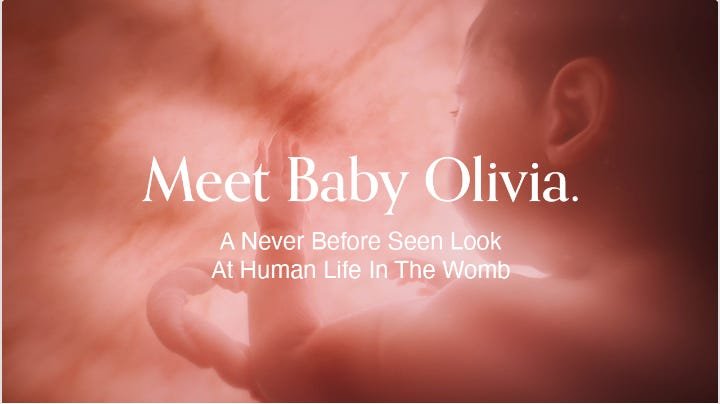Human Development and Abortion.
Social discomfort does not excuse a failure to discuss
Human development and abortion. These are probably the most controversial and divisive current topics in the domains of health, medicine, medical freedom, and American politics. Which means that we should discuss them openly rather than avoiding them, hoping to at least better understand the merits and limitations of each others’ points of view.
When training to become a pathologist so long ago, I had to “gross in” products of conception. What appropriate slang that is. This involved taking abortion material and placing it into small cassettes for formalin fixation, wax embedding, and slide sectioning. So that there would be a permanent record, and so that a board certified pathologist could both verify a “successful” abortion and also assess whether any rare pregnancy-related disease process had occurred (gestational trophoblastic diseases). The resulting glass slides revealed brain, fingers, eyes, etc. Basically, slices of very small babies.
There is so much propaganda and jingoism surrounding this issue. How can anyone see through all of this, separate yourself from all that you have been told by others that you should think and feel, and just independently process the underlying facts?
While I was at a conference last week, the video posted below was shown by Lila Rose, who started the organization “Live Action” when she was 15 years old, and currently serves as its President. It is one of the most moving short documentaries that I have seen in a long time. Those who endorse abortion usually find themselves challenging and rethinking their own assumptions after watching this video.
No matter where you stand on this topic, I personally implore you to take the time to view this, and then allow yourself some personal time to just process what you have seen. That is all I ask. Just watch it and then let yourself think.
Abortion, and in particular late term abortion, are topics that most are reluctant to talk about in “polite” company. That is, unless all participants share a similar viewpoint. So for now, between authors and readers, let’s agree to be impolite but open minded for just a while.
As a warm up, and to establish a starting point for our discussion, the following summarizes some general statistics (ergo facts) about late-term abortion political policies in the United States. I hope that these can help bring clarity and establish common ground for any conversation on the topic.
In Dobbs v. Jackson Women’s Health Organization (2022), the Supreme Court overturned Roe v. Wade (1973) determining that, in the absence of specific congressional action and federal law, individual states have the right to regulate the practice of medicine (10th amendment) and thereby the court returned the right to regulate abortion to individual states.
At this time, there are seven states that have no gestational time restrictions to obtaining a legal abortion, and nineteen states allow abortions up until viability.
Every state has exceptions regarding health of the mother.
President Trump has stated in a few interviews that he might support somewhere between a 15 to 18 week (gestational age) ban on abortion. Most recently, he stated that he believed a 15-week ban is about right. This has once again brought the issue of fetal gestational age and abortion rights into focus with the American people, and as a priority in political discourse concerning the upcoming presidential election.
Current polling indicates that the vast majority of registered voters believe that there should be limits to later-term abortions. Only around 20% of registered voters believe that terminating a pregnancy in the last three months should be legal (Polling and image from Gallop).
On the Horizon- Chronic Cognitive Dissonance
Artificial Wombs. Will birth mothers be made redundant?
As the age of medical viability of a fetus has become increasingly younger, there are now multiple research programs working to create artificial wombs. These moral quandaries are not going to go away.
This video is from SEVEN years ago:
In Sept of 2023, the Pediatric Advisory Committee (PAC) of the CDC met to discuss Artificial Womb Technology. This meeting was convened as a closed door session, in order to “permit discussion and review of trade secret and/or confidential commercial information (5 U.S.C. 552b(c)(4)).” According to the CDC website, this meeting was empaneled to discuss:
“appropriate development plans for establishing safety and effectiveness of artificial womb technology (AWT) devices, including regulatory and ethical considerations for first in human (FIH) studies. The discussion will be limited to the use of AWT as an alternative to current standard-of-care management of extremely premature infants in the Neonatal Intensive Care Unit.”
In this country, development of an artificial womb through human clinical trials of such a device is being considered by the US Government for the management of premature infants. But the development of artificial womb systems are also being considered for replacing human wombs in commercial research settings.
In the political breach driven by avoidance of this controversial subject, as a culture and as a species we are barreling willy-nilly towards a future that we can hardly conceive of. Little thought or discussion is being given to the moral implications of substituting machine for maternity outside of theological and scriptural scholarship or science fiction and fantasy literary works.
As a society, we find it difficult to wrap our minds around the ethics of terminating a pregnancy without resorting to superficial sloganeering, let alone discussing the ethics of growing (farming? engineering?) humans outside of the womb. Even the design of the clinical trials for such a project seem like something out of a dystopian futurist movie. Yet, as many do not consider a fetus a human, and deny the scientific truth of fetal neural development (including pain receptors), would they also argue that such a trial would (or even could) be ethical?
What sort of world do we, as humans, wish to live in? By avoiding frank and honest discussion, are we just conceding the future to those advocating for transhumanism?
The truth is that the ethics around abortion are deeply polarizing. In the USA, it is almost a 50/50 split as to whether people identify as “pro-life” or “pro-choice”. Both terms have been carefully crafted and poll-tested for intrinsic propaganda value. In any case, what is clear is that there isn’t a clear-cut majority on this. Even many Christians consider themselves pro-choice.
At some point - a fetus feels pain. I am not going to get into the gory details, many of which become self-evident when viewing the above video, but late term abortions are every bit as bad as one might imagine, maybe worse. Although reproductive rights organizations like to state that there is no evidence that a late-term fetus feels pain, this is not true. There is a lot of scientific evidence that documents that a late-term fetus or a premature infant feels pain (1, 2, 3). Therefore, a late-term abortion is most definitely a painful, horrific way to die.
I consider beliefs about the afterlife to be a personal matter, but does a third trimester fetus have a soul (a baby at this age certainly has a well developed central and peripheral nervous system), and if so what impact does this trauma have on that soul? About 1% of abortions happen at or after the 24 week gestation point. About 3% of abortions happen between 18 and 21 weeks. There is no way of knowing how many of these are due to medical reasons or for social/economic reasons.
Which is why I am going to end this essay by citing a peer reviewed paper which I recently read addressing this issue.
In this paper, the author identifies that the reason many women have late-term abortions has nothing to do with the health and well being of the mother or the child. That late term abortions are predominantly a consequence of unavoidable maternal or fetal health considerations is apparently a fiction- more propaganda. Rather a lack of awareness of the pregnancy early on, stigmatization, economic considerations and barriers to finding a clinic are listed as being the top reasons for choosing this “pathway.” Speaking for myself, I honestly can not find a single one of these reasons even remotely compelling.
From the peer-reviewed paper cited above:
Abstract
Context
In the United States, third‐trimester abortions are substantially more expensive, difficult to obtain, and stigmatized than first‐trimester abortions. However, the circumstances that lead to someone needing a third‐trimester abortion may have overlaps with the pathways to abortion at other gestations.
Methods
I interviewed 28 cisgender women who obtained an abortion after the 24th week of pregnancy using a modified timeline interview method. I coded the interviews thematically, focusing on characterizing the experience of deciding to obtain a third‐trimester abortion.
Results
I find two pathways to needing a third‐trimester abortion: new information, wherein the respondent learned new information about the pregnancy—such as of an observed serious fetal health issue or that she was pregnant—that made the pregnancy not (or no longer) one she wanted to continue; and barriers to abortion, wherein the respondent was in the third trimester by the time she was able to surmount the obstacles to abortion she faced, including cost, finding a provider, and stigmatization. These two pathways were not wholly distinct and sometimes overlapped.
Conclusions
The inherent limits of medical knowledge and the infeasibility of ensuring early pregnancy recognition in all cases illustrate the impossibility of eliminating the need for third‐trimester abortion. The similarities between respondents' experiences and that of people seeking abortion at other gestations, particularly regarding the impact of barriers to abortion, point to the value of a social conceptualization of need for abortion that eschews a trimester or gestation‐based framework and instead conceptualizes abortion as an option throughout pregnancy.
The final conclusion of this abstract is shocking - particularly as this study was approved for publication in a peer-reviewed scientific journal. How in the world does the fact the some women chose to have a late-term abortion because birthing an infant is an economic hardship or stigmatizing, mean that the medical community needs leave the late-term abortion option available for all who wish to obtain one throughout pregnancy.
My reading of the authors conclusions are that the author does not consider the late term fetus as having any stake in the decision. And therein lies the rub. As physicians, and as humans, do we cherish all life, and strive to avoid doing unnecessary harm and causing others pain? I personally believe that the State has inserted itself too aggressively into the individual affairs of its citizens, increasingly under the thesis that it is the proper role of the State to mitigate individual risk. But most citizens will probably agree that defining the parameters involved and mediating the ability of one person to perpetrate violence on another is a legitimate role of the State. So in the end, it seems to me that this all comes down to how one defines personhood, how one defines membership in team humanity. Personally, I prefer to err on the side of inclusivity.
Quoting from Hippocrates;
I will use those dietary regimens which will benefit my patients according to my greatest ability and judgment, and I will do no harm or injustice to them. Neither will I administer a poison to anybody when asked to do so, nor will I suggest such a course. Similarly I will not give to a woman a pessary to cause abortion.
I implore you to look inward and consider these matters carefully. As always, I do not seek to tell you what to think, but rather to help you to think for yourself. But I caution that your decisions in this matter will impose themselves onto your soul. So think bravely and carefully, as if the nature of your very soul depends on your decision.
If you would like these blog posts to appear in your email stream,
please sign up to






